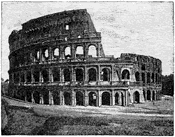
PISH-POSH FROM MY VIRTUAL SPACEby David EideThe Values That Emerge
|

Idle Musings of the Hypothetical Citizen
For some odd reason the hypothetical citizen was reading Out of My Life and Thought by Albert Schweitzer. He recognized, immediately, that Schweitzer was in the kind of dilemma that attacks many people after they had accumulated knowledge. What now? And that was especially true if the desires of a person went beyond what was apparent and flourishing: Politics, Business, Church, Education, Art, Medicine, Entertainment all presented opportunities and several, large drawbacks. He could not think of too many individuals who had thrown themselves into these pursuits and had come out unscathed. The overwhelming pressure was to do something in the normal sense of things. There was always the primitive fear of insanity to keep the miscreant in tow. And yet recent history was replete with the grotesque, perverse drive to overcome it all.
It was the shadow that both humiliates and humbles. So, perhaps Schweitzer was right; A person had to be drrven by something larger than himself and his own desires. Of course, as the society became more complex these desires were absorbed into the form of organization; everything ground to a common level that demoralized the young.
Ah, there was always television! He thought, "The one thing television had done that was positive, was to make everything more colorful." It was one delight of the present world that couldn't be denied. It would be the perfect place to sit in front of and renunicate the world as Schweitzer had recommended. He sat for an hour and began to ask himself, "does a person actually renounce and suffer or simply admires and learns from these things?"
He was, at least, clear about one thing: A culture slanted to the barbaric was going to reap its own horror show. The roving nomads of Attila were far more comfortable in a culture that drove out every speck of luminescence. "They drive me across a hot desert," he thought.
There were surprises along the way, of course. But, the political operatives had learned that if they reached into the camps of the barbaric tribes they could hold onto power.
The hypothetical citizen was examining a peculiar pressure he felt and came to the conclusion it was a "political atmosphere." The more he examined it, the more he realized that the political atmosphere was created by the desire to control a situation. If he was not part of the situation, then what?
He viewed most affairs that of the lowest common denominator and an oppressive weight to one called on to maintain an integrated personality. The issues were of a lowest common denominator so they all refered back to an ideal vision of how things, generally, should be. "Yes," he thought, "show me how things should be." He heard the same thing over and over again when he posed the question. That made him conclude that a large group of interests was going to claim for itself the general attitudes that people claim they adhered to: freedom, democracy, justice, etc. The group was always in the process of defining these things for itself in competition with other claims.
There was total absorption in the interest and the ideal animating it. And that created the stereotype through which the action of the group and of the "other" the group was opposing. The mind exhausted itself coming to grips with the question and that further increased the mythological disposition of large groupss.
After awhile, he got sick of looking at the thing. And then he saw the ruling stupidity and wanted to rush in with all his arguments.
The hypothetical citizen realized that his own nation had reached a crux moment. In all his studies of history he hadn't come up with any comparable power except Rome. The people had two options. They could willfully decline and give it up out of disgust or, they could rise to the occasion. He realized, that in the long future, the decline of America would not be like Great Britain but like the Soviet Union, with territory annexed by stronger powers and its population huddled behind the Appalachian Mts. He didn't want to see it.
The most disturbing fact always stared him in the face. The people were giving up their sovereignty to self-interested groups who took their interests to the government but, after a time, would blur in with the government. The citizens were not the liberal, democratic types the culture was dependent on but a mass of backward, illiterate, superstitious people who would be easily subdued as power became very aware of its place in world history. It depressed him. He had seen it in his youth. The people were naturally alienated from the powers that, supposedly, rose from them. It was too complex, too anonymous, too specialized for the average citizen who opted out by, at the very least, signing over a check to the interest group that they supported. But, the liberal, democratic culture, rooted in a transcendent, yet practical philosophy and dependent on the attentiveness of the citizens was going by the wayside. The people were being cut away from power as masses that had to be controlled; rather than liberal, democratic people to be educated and potentials set free in the wider society.
They didn't know their own history, they didn't know the documents, they didn't know how things worked, they didn't know anything but whether their own desires were being fulfilled. On that they built their lives.
They were becoming dependent, not on themselves, but on wealthy families, for their identity as democratic people.
Essay on the Return of Political Philosophy
© 2002 David Eide. All rights reserved.
David Eide
NEXT MY VIRTUAL SPACE